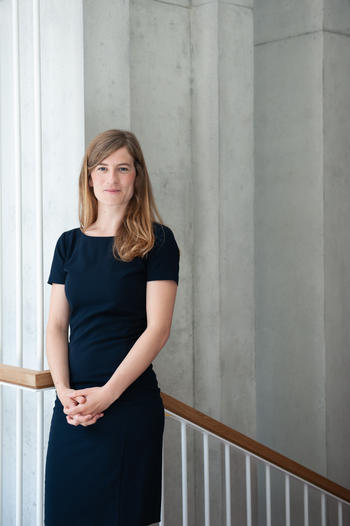Jun.-Prof. Dr. Emily Mae Graf

Eberhard Karls Universität Tübingen
Up to March 2023 Research Associate (Postdoc) in the Worldmaking project, since April 2023 Junior Professor for Chinese Language, Literature and Culture at the University of Tübingen and associated member of the Joint Center.
Short Biography
Emily Graf is Junior Professor of Chinese Language, Literature and Culture at the University of Tübingen. She was a postdoctoral researcher and lecturer at the Friedrich-Meinecke-Institute in the area of Global History (2021-23) und at the Institute of Chinese Studies (2018-2020) at the Freie Universität Berlin. As a postdoctoral associate she was part of the research project “A Translingual Conceptual History of Chinese Worlds” at the Joint Center for Advanced Studies “Worldmaking from a Global Perspective: A Dialogue with China”. She received her PhD in 2018 from Heidelberg University, analyzing the institutional histories of author museums in the PRC, the GDR and Taiwan. She conducted fieldwork in the PRC and Taiwan during a Visiting-PhD Fellowship at Renmin University of China, Beijing (2013-14). Her research interests include Chinese literature in a global context and cultural politics in the PRC and Taiwan. In her current research, she approaches the visual, conceptual and cultural histories of “barefoot doctors” and their relation to the field of global health.
Research Project
The World(s) of Barefoot Doctors: Worldmaking and Global Health in the PRCHer project investigates changes in the concept of world health in the PRC. Graf hereby focus on the time period starting during the Cultural Revolution in the mid-1960s until the Reform and Opening Period in the early 1980s. During this time a new term and concept was shaped in China: the so-called barefoot doctor (chijiao yisheng 赤腳醫生), a term that was used from 1968-1985 and thereafter was removed from public discourses on health in China. The barefoot doctor was a local health worker with only rudimentary medical training, promoting primary healthcare and hygiene. Like the term hygiene (weisheng 衛生) (Bo Hu 2017), the term barefoot doctor greatly changed medical knowledge in China, embodying (in theory more than in practice) a combination of “Chinese” and “Western” medical practices (Fang Xiaoping 2012). Their function to improve health care and hygiene in the countryside came to change what health meant not only China, but shaped health policies globally, culminating in the WHO Alma Ata Declaration on Primary Health Care in 1978. Not only the term but also the image of the barefoot doctor was used to create a concept of global health, as for example in propaganda posters in which the solidarity of the “Third World” was embodied by the barefoot doctor supporting African communities, for example. China’s medical aid to Africa did have its beginnings in 1963 in Algeria (Huang 2014), the dispatched medical teams, however, did not consist primarily of barefoot doctors, as such posters might imply. However, the concept of the barefoot doctor did circulate around the world (Zhou Xun 2020). The research question which leads me through my investigation is: How did the term, the image, the collective memory and the concept of the barefoot doctor shape the notion of “world health” in and beyond China?
Fang, Xiaoping. 2012. Barefoot Doctors and Western Medicine in China. Rochester, NY: University of Rochester Press.
Hu, Bo. 2017. “Travel and Transformation: A Diachronic Study of the Changing Concept of Weisheng in Chinese Journals, 1880–1930.” Contributions to the History of Concepts 12 (1): 1–21.
Huang, Yanzhong. 2014. “Domestic Politics and China's Health Aid to Africa.” China: An International Journal 12 (3): 176–98.
